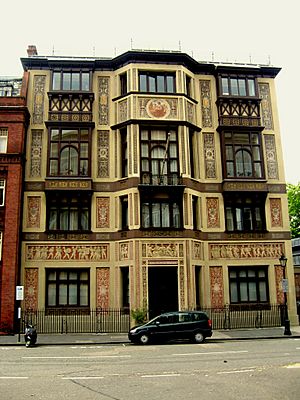Royal College of Organists facts for kids
The Royal College of Organists (or RCO) is a special group in the United Kingdom. It's like a club for people who love playing the organ and singing in choirs. The RCO helps people learn about organ and choral music. It offers classes, training, and support for organists and people who lead choirs.
The RCO also gives out special certificates and diplomas for organ playing, choir leading, and teaching. They have many learning programs across the UK. Plus, they have a huge library with over 60,000 books and music pieces about organs and choirs.
Contents
History of the RCO
The RCO started in 1864. It was first called the College of Organists. A man named Richard Limpus, who was an organist in London, founded it. In 1893, the college received a special honor called a Royal Charter. This made it an official "Royal" college.
In 1903, the RCO moved into a new building in Kensington Gore, London. They got to use this building for almost 100 years for a very small rent. But in the 1980s, it became clear they would have to pay a lot more rent. So, they sold the lease and moved to a new place in 1991.
Around 2003, the RCO planned to build a new, permanent home in Birmingham. This new place would have had a library and a concert hall. But in 2005, they decided not to move there. Instead, they chose to focus on their activities like teaching, events, and exams.
In 2014, the RCO celebrated its 150th birthday! They had a whole year of special events. These included concerts, music festivals, and new books. In 2020, the RCO started a new tradition: National Organ Day, held every year on April 18.
Who Were the First Members?
When the College of Organists first started, these were some of its first members:
- G.B. Arnold, from New College, Oxford
- W.H. Adams, from St Martin-in-the-Fields
- T.G. Baines, an organist at St Margaret's, Westminster
- J. Blockley, from St Mark's Regents Park
- A.S. Cooper
- W.B. Gilbert, from All Saints Church, Maidstone
- A.W. Hammond, who was also the editor of the Musical Standard
- Edward Herbert, from Sherborne Abbey
- James Higgs
- Edward John Hopkins
- Charles Kelly, from All Souls Church, Langham Place
- F. Kingsbury
- Richard Limpus, the founder
- William Henry Longhurst
- E. M. Lott, from St Peter's, Notting Hill
- Dr. Marshall, from St John's Church, Kidderminster
- Edwin George Monk
- Ebenezer Prout
- W. Spark, from Leeds Town Hall
- Charles Steggall
- Charles Edward Stephens
- Joseph Surman, from Exeter Hall
- W.J. Westbrook, from St Bartholomew's, Sydenham
Edmund Hart Turpin became a special member of the RCO in 1869 without taking an exam. He later took over from Richard Limpus as the honorary secretary in 1875.
Learning and Support
The RCO Academy is a program that helps people learn. It offers training and support for organists and choir leaders. This includes students, people who play music for fun, and even professional musicians.
The college offers many ways to learn. They have classes, workshops, and courses all over the UK and in other countries. They also have online help through their iRCO learning hub. You can also find teachers who are approved by the RCO.
RCO Exams and Diplomas
The RCO offers five different diplomas. These are like special certificates that show what you can do.
- The Diploma of Colleague (CRCO) is for organists who are still learning. It helps them build a good foundation.
- The Associateship Diploma (ARCO) shows that you are very good at playing the organ and understand music theory.
- The Fellowship Diploma (FRCO) is the highest level. It's for those who already have the ARCO. A cathedral organist would usually have this diploma.
- The Choral Directing Diploma (Dip CHD) is for people who are good at leading choirs.
- The Licentiateship in Teaching (LTRCO) is for organ teachers. You need to have the ARCO or FRCO to get this one.
In 2016, the college also started a simpler certificate. It's called the RCO Certificate of Accredited Membership (CAM).
The RCO Library
The RCO has a huge library. It has over 60,000 special books and music pieces about organs and choirs. This amazing collection is kept at the Royal Birmingham Conservatoire's Curzon Library and the Royal College of Music, London.
See also
- Anne Marsden Thomas
- American Guild of Organists


